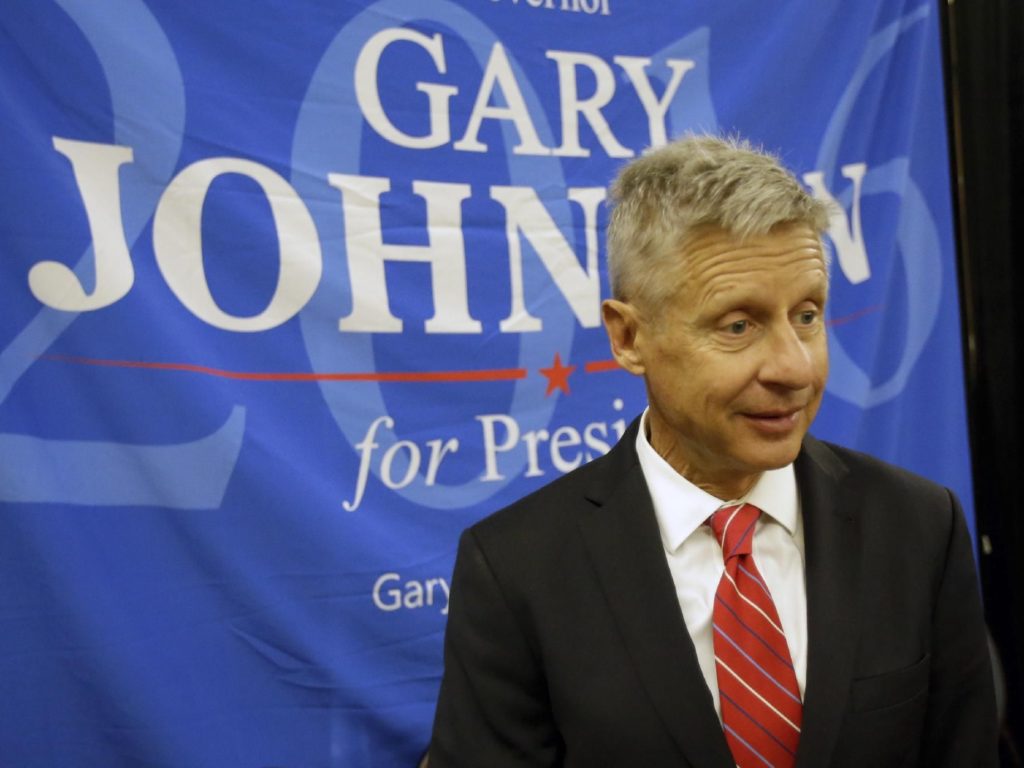Libertarian’s Gary Johnson has never been the typical politician

Ronald Reagan won a historic landslide victory in the 1984 election, taking 49 of 50 states. But he failed to win the vote of a young Republican businessman in New Mexico whose willingness to go against the political grain has made him this presidential campaign’s X-factor. Outraged at the GOP president’s budget deficits, Gary Johnson for the first time voted for the Libertarian candidate. Ten years later, Johnson became New Mexico’s governor, and was known for vetoing bill after bill before he became a national curiosity for advocating legalized marijuana. Now, at age 63, he’s the Libertarian Party’s presidential nominee, a marijuana-promoting fitness aficionado who summited Mount Everest and now climbs a political mountain with tough odds of reaching the top. Though Johnson has grabbed more attention for his stance on drugs and difficulty answering foreign-policy questions, fiscal conservatism remains his animating force. “I always pushed the envelope,” said Johnson, who’s proposed deep cuts to military and other government spending as well as elimination of the federal departments of Homeland Security, Commerce, Education, and Housing and Urban Development. “I wasn’t a wallflower when I was governor and I do think government spends too much money in areas that don’t make a big difference in people’s lives.” Before he came out for legalizing marijuana shortly after his re-election as New Mexico governor in 1998, Johnson was nicknamed “Governor Veto.” He piled up a record 700-plus vetoes during his two terms in Santa Fe. Admirers liked his dedication to limiting the size of government. Detractors considered him narrow-minded and incurious about the outside world. “He just does not believe government should be involved in dealing with social problems,” said state Sen. Jerry Pino y Ortiz, who ran two social service agencies during Johnson’s administration and feels the former governor let down his achingly poor state. “It’s like the dad who’s proud that his kid gets by on the smallest allowance at school, but the kid’s shoes have holes in them.” Rod Adair is a Republican political strategist and former state lawmaker who agrees with Johnson’s small-government philosophy. The problem, Adair said, is that the former governor knows relatively little beyond that. He says Johnson prefers to focus on his obsessive fitness routine — he’s an ultramarathoner and triathelete who summited Mount Everest in 2003 after leaving office as governor— rather than learn about unfamiliar areas like foreign policy. “Running for president, I don’t care where you’re governor, it’s very different and you need to have a degree of intellectual curiosity,” Adair said. “He doesn’t have that.” Supporters and admirers in New Mexico agree that Johnson was an unusual politician. He didn’t horse trade or hold grudges, they say, and was generally direct and honest. Those are attributes that have won him an unusually wide swath of support in the current presidential race, helping him appeal both to some disaffected liberal Bernie Sanders voters and more traditional libertarians. He and running mate Bill Weld, Massachusetts’ former GOP governor, are the only third-party ticket on the ballot in all 50 states Johnson has fallen short of the 15 percent threshold in national polling needed to enter the presidential debates, polling at about 8 percent for several months. If he receives 5 percent of the vote in November, that would be a bonanza for the Libertarian Party, assuring it of a valuable place on state ballots in the 2020 election. Johnson’s deer-in-the-headlights response to a question from a television interviewer about what he’d do to deal with the crisis in the Syrian city of Aleppo — “What’s Aleppo?” — earned him derision in September, though he quickly apologized. Weeks later, Democrats feared Johnson was pulling enough young voters from [Hillary] Clinton to throw some swing states to [Donald] Trump. Johnson’s campaign put out a lengthy statement urging Republicans disgusted with Trump’s taped boasts about forcing himself on women to vote Libertarian instead. Johnson says he’s happy to criticize Clinton, even though his running mate says his focus is solely on Trump. In an interview at a hotel near his Santa Fe home, Johnson predicted the national debt would more than double to $50 trillion should Clinton implement her various plans. She’s proposed spending that would be paid for by $1.4 trillion in tax increases on the wealthy. Johnson said those would doom the economy. “If those tax hikes go through, I think the recession of 2008 is mild by comparison,” Johnson said. Johnson was born in North Dakota, but his father moved the family to New Mexico when the future governor was 13. Raised by a school teacher and an accountant for the federal Bureau of Indian Affairs, Johnson founded a construction company while he was still at the University of New Mexico. The firm grew and became a major contractor on Intel’s chip factory in Albuquerque, making Johnson his fortune. In 1994 he entered a competitive four-way Republican primary for governor. Johnson squeaked through with just over 30 percent of the primary vote, then defeated an incumbent Democrat whose party was so badly split that his own lieutenant governor ran against him. The new Republican governor confronted a Democratic-controlled legislature and it was ugly. Johnson vetoed more than half of the bills that came to his desk that first year and kept rejecting ones afterward. “When you have both houses of the legislature in the opposite party you’re always going to have a lot of sparks that fly, especially on financial issues,” said David Harris, Johnson’s longtime finance secretary. “He always applied the same test to everything,” Harris added — veto it “if it didn’t improve the government or it raised taxes.” Over the years Johnson routinely shot down efforts to create commemorative license plates that would collect extra money for wildlife preservation, firefighters or West Point graduates. He vetoed a proposal for a state holiday recognizing Hispanic labor icon Cesar Chavez. He vetoed a $2 hotel room fee increase in the city of Las Cruces. He even vetoed the entire budget in
Alabama, states reliant on fossil fuels sue over new clean air rules

States and industry groups dependent on fossil fuels filed court challenges Friday to President Barack Obama‘s Clean Power Plan, which aims to reduce greenhouse gas emissions. Opponents of the plan filed a flurry of lawsuits at the U.S. Court of Appeals as the Environmental Protection Agency published its final version of the new regulations. The challenges from all but two of the 25 states were filed by Republicans. They deride the plan as an “unlawful power grab by Washington bureaucrats” that will kill coal mining jobs and drive up electricity costs. “The Clean Power Plan is one of the most far-reaching energy regulations in this nation’s history,” said West Virginia Attorney General Patrick Morrisey, among those leading the challenges. “I have a responsibility to protect the lives of millions of working families, the elderly and the poor, from such illegal and unconscionable federal government actions.” The Obama administration and environmental groups counter that the rules are needed to cut carbon emissions while curbing the worst impacts of climate change and sea-level rise. They also say the plan will spur new clean-energy jobs. The new rules require states to cut carbon emissions by 30 percent by 2030. Each state has a customized target and is responsible for drawing up an effective plan to meet its goal. “We are confident we will again prevail against these challenges and will be able to work with states to successfully implement these first-ever national standards to limit carbon pollution, the largest source of carbon emissions in the United States,” said EPA Administrator Gina McCarthy. The EPA says it has authority to enact the plan under the Clean Air Act. At issue are dueling provisions added to the law by the House and Senate in 1990. The EPA’s interpretation relies on the Senate language, but opponents argue that the House version should win out. EPA already regulates other power-plant pollutants under a different section of the Clean Air Act, and the opponents claim the law prohibits “double regulation.” Under the act, certain challenges to agency rules skip the federal district court and go directly to the appeals court in Washington, D.C. Morrisey also filed a stay barring the plan from taking effect while the court challenges proceed, a question that will likely be up to the Supreme Court. “We expect polluters and their allies to throw everything they’ve got at the Clean Power Plan, and we expect them to fail,” said Sierra Club Executive Director Michael Brune, among those defending the law. “The Clean Power Plan is based on a law passed by Congress, upheld by the Supreme Court, and demanded by the American people.” The states challenging the plan in court are Alabama, Arkansas, Arizona, Colorado, Florida, Georgia, Indiana, Kansas, Kentucky, Louisiana, Michigan, Missouri, Montana, Nebraska, New Jersey, North Carolina, Ohio, Oklahoma, South Carolina, South Dakota, Texas, Utah, West Virginia, Wyoming and Wisconsin. Also filing suit against the EPA on Friday was Murray Energy Corp., the nation’s largest privately owned coal company. Members of Congress from coal-mining states joined in, saying they will introduce new legislation aimed at blocking the EPA from enforcing the plan. On the other side, 15 states and the District of Columbia say they are backing the Obama administration and will begin working to comply with the new rules. There is some political variation in the positions taken within the states. In North Carolina, for example, the environmental agency controlled by the Republican governor joined the opposition without the participation of the state’s Democratic attorney general. Governors in Colorado and Michigan said they will work to comply with the new EPA rules, even as attorneys general from their states joined the lawsuit. “Clean air and protecting public health should be everyone’s top priority,” Colorado Gov. John Hickenlooper, a Democrat, said Friday. “We believe that Colorado can achieve the clean air goals set by the EPA, at little or no increased cost to our residents.” Republished with permission of the Associated Press.


